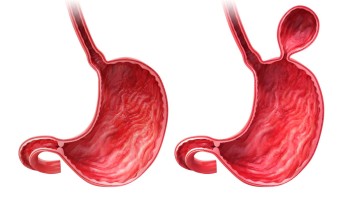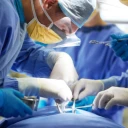Symptoms and Complications of Hiatal Hernia

- What is a hiatal hernia?
- Symptoms of hiatal hernia and Gastro-oesophageal Reflux
- Complications of a hiatal hernia
- How to avoid the complications and alleviate the symptoms of hiatal hernia and Gastroesophageal Reflux?
- Request a free surgical consultation for laparoscopic hiatal hernia surgery
- Hiatal hernia is a very common medical problem that causes a series of characteristic and very annoying symptoms.
- The symptoms associated with hiatal hernia are directly associated with Gastroesophageal Reflux, the complications of which are quite serious.
- The main complication of hiatal hernia and GOR is oesophagitis, and it is advisable to solve it surgically before it worsens.
What is a hiatal hernia?
Hiatal hernia gets its name from the fact that the hole in the diaphragm that is crossed by the oesophagus widens and the stomach rises through it, causing the characteristic symptoms of heartburn and burning that we will explain below.

Do you have a hiatal hernia and need surgery?
Request a free and immediate surgical consultation with our specialist in General Surgery.
If you want to know more about hiatal hernia, you can consult our article "Hiatal hernia, causes, symptoms and treatments".
Beyond the hiatal hernia itself, the main problem in these cases is a pathology associated with it that causes the usual symptoms of hiatal hernia called Gastroesophageal Reflux, which can, in the most serious cases, cause complications that greatly affect the patient's daily life.
Symptoms of hiatal hernia and Gastro-oesophageal Reflux
Although it is possible for hiatal hernia to be asymptomatic, i.e. a patient may have a dilated hiatus, the stomach may move up through it, but the characteristic symptoms of hiatal hernia do not occur.
However, patients with hiatal hernia who do not have symptoms do not usually read this type of article, so we are going to talk about the most common symptoms of hiatal hernia, which are associated with stomach acid rising up into the throat.

The initial symptoms, which are often, but not always successfully, controlled by conservative treatment, are as follows:
- Pyrosis, heartburn or burning in the chest: This can be felt rising up the throat and is especially noticeable when the patient is bent over or lying down.
- Regurgitation of food: This is common as the lower oesophageal sphincter has a lack of muscle associated with reflux and hiatus hernia.
- Vomiting: Due to the weakness of the structures connecting the patient's mouth and stomach, the chances of nausea and vomiting are greater, and it is possible to expel bloody vomit in cases where the patient suffers from oesophagitis, one of the most serious complications of gastro-oesophageal reflux, which we will explain later.
- Aspiration pneumonia: This occurs when food coming up the oesophagus passes into the trachea, which can cause breathing problems.
- Throat irritation: The main cause is acid coming up from the stomach.
- Hoarseness, nocturnal cough and dysphonia: The muscles and tissues that make up the oesophagus are affected by reflux and can cause this type of problem.
- Dysphagia and alteration of the oesophagus: These are the most serious cases and can cause difficulties for the passage of food through the oesophagus to the stomach.
When suffering from these symptoms, the intake of alcohol and tobacco aggravate the symptoms, and in many cases it is advisable to change the diet and adopt a series of postural habits to avoid them.
In addition to these symptoms, there are a series of complications associated with them that are, in many cases, a direct reason for laparoscopic hiatal hernia surgery.
Complications of a hiatal hernia
If the hiatal hernia is not resolved in time, treatment is not carried out or the hiatal hernia operation is not performed, it is possible that quite serious complications may occur.
Among the complications of hiatal hernia, all of them are associated with Gastroesophageal Reflux, the most serious complication that causes the most problems being oesophagitis:
- Oesophagitis: This is the inflammation of the mucosa lining the oesophageal duct, caused by continuous and persistent acid reflux in the area due to hiatus hernia. Depending on the severity of the symptoms of oesophagitis, we can differentiate between 4 levels of severity:
- Grade 1: Mild inflammation in only a portion of the mucosa.
- Grade 2: Inflammation of the entire mucosa, including superficial ulcers.
- Grade 3: At this point, deep ulcerations occur with fibrosis of the submucosa, and the oesophageal muscle may shorten.
- Grade 4: Stenosis of the oesophagus, closure of the oesophagus, as well as severe fibrosis or hardening of the oesophagus.
- Barrett's oesophagus: This is a very advanced complication of oesophagitis and consists of a cellular change in the area, which can, in the most complex and severe cases, degenerate into cancer.
- Bleeding: In the case of advanced oesophagitis, the patient may bleed due to ulcers forming in the oesophagus.
- Bronchial aspiration pneumonitis: When reflux into the throat occurs, gastric contents may be aspirated into the airways and in some cases degenerate into pneumonitis or respiratory infections.
- Anaemia: If advanced oesophagitis with bleeding occurs, the likelihood of anaemia increases considerably.
How to avoid the complications and alleviate the symptoms of hiatal hernia and Gastroesophageal Reflux?
The options in these cases are firstly to carry out conservative treatment, which consists of a restrictive diet with certain foods, losing weight, stopping smoking and acquiring a series of postural habits, especially associated with the times when the patient sleeps or goes to bed, the key being to avoid going to sleep until 2 or 3 hours after eating; or on the other hand, performing a hiatal hernia operation by laparoscopy, which allows permanent relief of the symptoms.
Request a free surgical consultation for laparoscopic hiatal hernia surgery
If you suffer from severe symptoms of hiatal hernia and gastroesophageal reflux and surgery is indicated, you can request an assessment consultation with one of our specialists in General and Digestive Surgery to assess your case and together make the best decision about your particular case.

Do you have a hiatal hernia and need surgery?
Request a free and immediate surgical consultation with our specialist in General Surgery.
Medical disclaimer: All the published content in Operarme is intended to disseminate reliable medical information to the general public, and is reviewed by healthcare professionals. In any case should this information be used to perform a diagnosis, indicate a treatment, or replace the medical assessment of a professional in a face to face consultation. Find more information in the links below:

